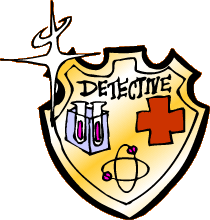Dr. Stephen Redd, a.k.a. Dr. Asthma
This disease detective knows a lot about his case.
 Dr. Redd is the Chief of the Air Pollution and Respiratory Health Branch in the National Center for Environmental Health at the Centers for Disease Control and Prevention (CDC). (Whew! That's a title!) He used to study other diseases, but became "Dr. Asthma" about four years ago when he realized that our nation's lungs needed his help!
Dr. Redd is the Chief of the Air Pollution and Respiratory Health Branch in the National Center for Environmental Health at the Centers for Disease Control and Prevention (CDC). (Whew! That's a title!) He used to study other diseases, but became "Dr. Asthma" about four years ago when he realized that our nation's lungs needed his help!
 Dr. Redd spends lots of time on the phone and travelling around the country to work with other CDC groups, as well as outside organizations, on the topic of asthma. Dr. Redd's team closely tracks the asthma cases that occur in the U.S. Their goal is to learn more about what's going on with asthma, so that they can stop the disease in its tracks. Dr. Redd also oversees national programs to help people get their asthma under control.
Dr. Redd spends lots of time on the phone and travelling around the country to work with other CDC groups, as well as outside organizations, on the topic of asthma. Dr. Redd's team closely tracks the asthma cases that occur in the U.S. Their goal is to learn more about what's going on with asthma, so that they can stop the disease in its tracks. Dr. Redd also oversees national programs to help people get their asthma under control.
Asthma: The basics.
Asthma is a breathing condition that leads to coughing, wheezing (whistling sound while breathing), trouble catching your breath, and a chest that feels tight. Even chest pains, dizziness, and always having to clear your throat can be signs of asthma, and should be checked out by a doctor.
For people with asthma, things like cold or dry air, dust, pollen, pollution, cigarette smoke, or stress can be "triggers," which cause the body to pump out chemicals that make the airways shrink, stopping air from getting through to the lungs—and causing an asthma attack. An asthma attack can feel like trying to suck air in and push it out through a straw!
Physical activity can cause asthma attacks too. Although experts aren't entirely sure why physical activity sometimes brings one on, a likely explanation is that fast breathing through the mouth (like happens when you get winded) can irritate the airways. Dr. Asthma advises, "When smog levels are high, it's always a good idea to participate in physical activity in the morning instead of in the afternoon — smog levels rise later in the day."
Is asthma a big problem for kids today? "About five million young people in our country have asthma," says Dr. Redd, "When your parents were young (about 30 years ago), asthma was an uncommon disease seen in only about 3% of people. Now, it's up to at least 7%, and rising. As young kids, more boys have asthma. But some people 'grow out' of asthma (their lungs get bigger and they no longer have symptoms) and the tables turn. So, as teenagers, slightly more girls have the disease."
How can kids help their friends who have asthma? If their condition is under control, people with asthma can do the same things that you can. So, your job is to help them know that it's okay to use their inhalers or take their medicines. Also, don't worry about catching asthma 'cuz it isn't contagious.
If your friend or relative is having an asthma attack, it can be scary to watch. But according to Dr. Redd, the first thing to do is stay calm. Encourage the person to use an inhaler (if it's on hand) and get help.
What causes asthma, anyway? No one knows for sure yet. Dr. Redd reports that people's genes help decide whether they develop asthma. Some researchers think that since today's young people are exposed to germs that are different than the ones that kids faced 20 or 30 years ago, their immune systems might not develop in the same way, leading to more asthma and allergies. The fact that more people than ever are overweight also might be related to increased asthma cases. (This does not mean that you should lose weight if you have asthma, though if you're overweight, it could help. Talk to your parents or your doctor to find out.) Perhaps something in the environment causes asthma... One thing is for sure — the disease detectives have leads and they're on the case!
Check this out
- See why BAM says, "Don't Let Asthma Keep You Out of the Game."
- Read about the American Lung Association.
- Read interviews with Olympians Misty Hyman and Amy VanDyken, Tom Dolan, or Kurt Grote.